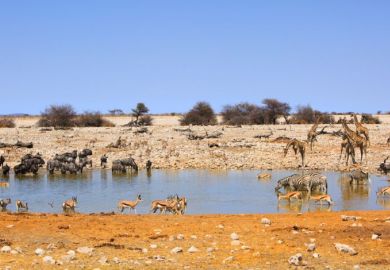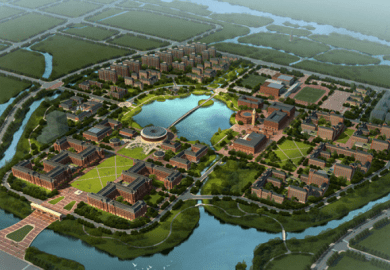Universities that aim to address the Sustainable Development Goals through collaboration with the Global South must engage with the whole local ecosystem rather than just individual institutions, a conference has heard.
Increased North-South cooperation has been touted as an important tool to tackling some of the world’s biggest issues, outlined in the United Nations’ SDGs. Speaking at THE’s Innovation and Impact Summit, Abid Khan, deputy vice-chancellor of Monash University, said that to address the SDGs, such as climate action, research would require local understanding and “tailoring”.
Jacqueline Cramer, professor of sustainable innovation at Utrecht University, warned that it would be important not only to build strong cooperation between universities across the Global South and the Global North, but also “to build good cooperation with the supporting ecosystem”, such as local industry, government and non-governmental organisations operating in an area.
Cooperation between universities and parties outside academia was a really crucial element because the SDGs could only be solved together in an international context, she said. “Knowledge cooperation should be attuned to the whole ecosystem, not just to the universities; they can’t operate in isolation,” she said.
Professor Cramer added that this was particularly true because universities were constrained by their “main focus” on publishing in good journals. Building a reputation and developing strong collaborations with the South, and all the things that go along with that, cost time and energy, she said. “And time and energy is limited, so we have to be realistic.”
She said universities must play to their strengths, so for the Netherlands, this would be in areas such as water management, the circular economy and agriculture. Universities must also engage with “proactive” NGOs and governments, Professor Cramer added: “Those willing to make a change, not those people who want to keep it like it is.”
Her work on conflict and cooperation and climate change had shown her that reaching communities was the most difficult but also the most crucial task, she said. However, “policy uptake” also required “connection between what is happening in the local communities and the wishes of the government – and there are many conflicts”, she added.
There must be also people willing to work to put the needs of the local communities on the political agenda, she said.
Professor Cramer said she found that when “researchers are also able to reach out to the politicians, and really have a dialogue and change their mindset…then we achieved marvellous results”.
But this was not easy to do, she said, even for the members of universities in the South, because academics were not necessarily embedded in those communities.
Shinji Kaneko, executive vice-president of global initiatives at Hiroshima University, agreed that it was an issue. Awareness of local needs was critical, he said, but collaborations with universities in other countries had shown that it could not be presumed even among local academics.
The migration to the capital cities, where most universities are based, means that “we visit them and ask their local needs, and then we face a lot of difficulty precisely understanding what are the actual local needs”, he said.
Register to continue
Why register?
- Registration is free and only takes a moment
- Once registered, you can read 3 articles a month
- Sign up for our newsletter
Subscribe
Or subscribe for unlimited access to:
- Unlimited access to news, views, insights & reviews
- Digital editions
- Digital access to THE’s university and college rankings analysis
Already registered or a current subscriber? Login








